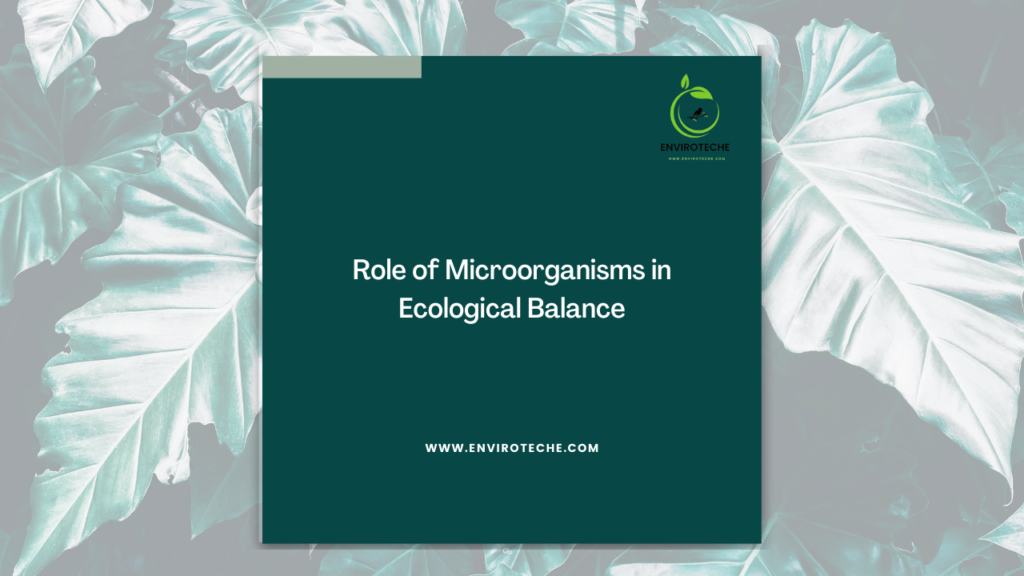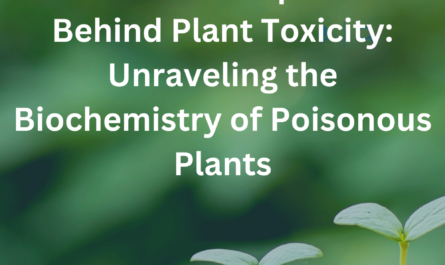Table of Contents

Introduction to Microorganisms in Ecological Balance:
Microorganisms play an important and intricate role in maintaining the complex equilibrium of ecosystems and guaranteeing ecological stability, while frequently being too small to be seen without a microscope. These tiny living things, such as bacteria, fungi, viruses, and archaea, are found all over the planet, from the deepest ocean basins to the highest mountain peaks. Despite their tiny size, they have a significant and pervasive impact on the ecology.
Microorganisms, which are frequently underappreciated, are the unsung heroes of the natural world, performing a variety of key tasks that are essential for the health and the operation of ecosystems. These tiny creatures play critical roles in a number of ecological processes, including the breakdown of organic matter, the recycling of nutrients, the formation of symbiotic relationships, the control of disease, and the removal of environmental pollutants. For the purpose of building a sustainable future and preserving the general health of our planet, it is essential to understand the fundamental role of bacteria in sustaining ecological equilibrium. This essay aims to investigate in-depth the numerous, interconnected functions that bacteria provide in maintaining ecological equilibrium.
We will delve into their contributions to the cycle of nutrients and decomposition, their participation in symbiotic relationships, their function in controlling diseases, and their significant involvement in environmental cleanup efforts.
Nutrient Cycling
It is impossible to overstate the importance of microorganisms, which include bacteria, fungi, viruses, and archaea, in the cycling of nutrients. The processes of decomposition, nitrogen fixation, nitrification, denitrification, and phosphorus cycling all depend on them. These microorganisms assist in the breakdown of organic waste, releasing important nutrients back into the soil. Additionally, they help to release and control the availability of phosphorus. They also convert atmospheric nitrogen into forms that plants can utilize. Additionally, bacteria actively participate in the carbon cycle by respiring, degrading, and sequestering carbon. Their participation in these processes is essential for maintaining nutrient availability, promoting plant growth, and controlling the carbon dioxide equilibrium in ecosystems.
Decomposition
Organic compounds are broken down during decomposition, a natural process facilitated by microorganisms like bacteria and fungi. This procedure restores nutrients to the environment, promoting soil fertility and the nutrient cycle. In order to get energy and nutrition, microorganisms secrete enzymes that disassemble complicated organic compounds into simpler ones. Temperature, moisture content, and chemical makeup are only a few of the factors that control decomposition. It contributes significantly to the carbon cycle by releasing carbon dioxide into the atmosphere and helping the soil store carbon. Decomposition also maintains soil fertility, enhances soil structure, and provides other species with an energy source.
Symbiotic Relationships
Symbiotic relationships are close, mutually advantageous relationships between different species that are essential to maintaining ecological equilibrium. These interactions often occur in nature and have a significant effect. One example is mutualistic symbiosis, in which two species work together for both of their benefits. The process of pollination is a well-known example, in which blooming plants and pollinators like bees and butterflies depend on one another for reproduction and food supply. Similar to this, plants and fungi interact mycorrhizal to the advantage of both, with plants providing sugars in return for increased nutrient absorption from fungi. Symbiotic relationships emphasize the interconnectedness and interdependence of species in maintaining ecological balance through fostering cohabitation, boosting species diversity, and boosting ecosystem resilience.
Bioremediation
An economical and ecologically friendly technique called bioremediation uses microorganisms to break down or eliminate contaminants from polluted environments. It works as a powerful tool for regenerating ecosystems that have been harmed by a variety of contaminants, such as oil spills, heavy metals, pesticides, and industrial waste.
These contaminants may be converted into less hazardous molecules by microorganisms like bacteria and fungi via processes including biodegradation and bioaccumulation. Since bioremediation is often more sustainable, less invasive, and can be tailored to target particular toxins and environmental circumstances, it has various benefits over standard cleaning procedures. Bioremediation has the ability to significantly reduce the effects of pollution and aid in the restoration of ecological balance by making use of microorganisms’ natural abilities.
Climate Regulation
The crucial job of controlling temperature in ecosystems is mostly carried out by microorganisms. They assist in the control of greenhouse gases, primarily carbon dioxide (CO2) and methane (CH4), via a variety of metabolic processes. By converting atmospheric CO2 into organic matter via photosynthesis, photosynthetic microorganisms like cyanobacteria and algae lower the concentration of the gas. Microorganisms also contribute to the carbon cycle by respiring CO2 and breaking down organic compounds. Methane is a powerful greenhouse gas that is produced and consumed by certain microorganisms, especially methanogenic archaea. Microorganisms significantly affect global temperature by modifying the flow of these gases between the atmosphere, soil, and water. They also help to maintain the biological balance in our planet’s ecosystems.
Disease Control
In ecosystems, microorganisms are essential for the regulation of illness. While certain microbes may infect people, many others act as natural enemies and control the spread of dangerous species. As biocontrol agents, some bacteria and fungi, for instance, produce substances that prevent the emergence of dangerous diseases. Additionally, microbes support the immune systems of people, animals, and plants. They create a varied microbiota that, by competing for resources and producing antimicrobial chemicals, aids in preventing the colonization of harmful microorganisms. Microorganisms play a crucial role in avoiding diseases by maintaining a balanced microbial ecology, which increases the resilience and general health of ecosystems and the species that live there.
Environmental Cleanup
Microorganisms have often been utilized for restorative reasons and have shown to be very successful in the process of environmental cleanup. They have incredible abilities to digest and get rid of a wide range of contaminants, including oil spills, industrial chemicals, and dangerous compounds. Microorganisms use processes including biodegradation and bioaccumulation to transform these pollutants into less harmful compounds during bioremediation.
A sustainable and environmentally friendly method of environmental rehabilitation has been made possible by the development of particular enzymes by certain bacteria and fungi that target and break down contaminants. By transforming heavy metals into less hazardous forms or immobilizing them in the soil, microorganisms also assist in the detoxification of heavy metals. Microorganisms are excellent allies in preserving and restoring the health of our ecosystems, ensuring a sustainable future, due to their innate flexibility and capacity to exist in many environments.
Importance
it is impossible to overstate the importance of microorganisms in maintaining ecological balance. These tiny organisms play a critical role in several ecological processes and are essential for the sustainability and overall health of ecosystems. Microorganisms are essential to the nutrition cycle because they help break down and recycle organic waste and ensure that key nutrients are available for plants and other living things. They vigorously promote decomposition, enabling efficient nutrient recycling and soil fertility management. Furthermore, bacteria form symbiotic relationships with plants and animals that facilitate cohabitation and increase ecological diversity.
Furthermore, by acting as natural enemies, limiting the spread of diseases, and strengthening organisms’ immune systems, microbes have a substantial impact on the dynamics of illness. Additionally, they are useful in bioremediation processes that effectively break down and remove contaminants from the environment. To preserve the delicate balance of ecosystems and work towards a sustainable future, it is essential to comprehend how microorganisms contribute to ecological balance.
Conclusion
Invisible microbes are essential to maintaining ecological balance and the wellbeing of our planet. By performing a number of functions relating to nutrient cycling, decomposition, symbiotic relationships, disease control, and environmental cleansing, they help to maintain the stability and sustainability of ecosystems. Microorganisms help to degrade organic matter, recycle nutrients, and increase soil fertility.
They establish symbiotic interactions with plants and animals that benefit both parties and strengthen ecosystem resilience. By repressing pathogens and supporting immune systems, microorganisms regulate the dynamics of disease. In bioremediation, which purges polluted areas, they are also crucial. Microbes must be acknowledged and recognized for their contributions if ecological harmony and a sustainable future are to be reached.
Also Read About this Link
Microorganisms in Ecological Balance
Microorganisms in Ecological Balance
Microorganisms in Ecological Balance
Microorganisms in Ecological Balance
Microorganisms in Ecological Balance
Microorganisms in Ecological Balance
Microorganisms in Ecological Balance
Microorganisms in Ecological Balance
Microorganisms in Ecological Balance
Microorganisms in Ecological Balance
Microorganisms in Ecological Balance
Microorganisms in Ecological Balance
Microorganisms in Ecological Balance
Microorganisms in Ecological Balance
Microorganisms in Ecological Balance
Microorganisms in Ecological Balance
Microorganisms in Ecological Balance
Microorganisms in Ecological Balance
Microorganisms in Ecological Balance
Microorganisms in Ecological Balance
Muhammad Arslan1
1Department of Environmental Sciences, Government College University Faisalabad
